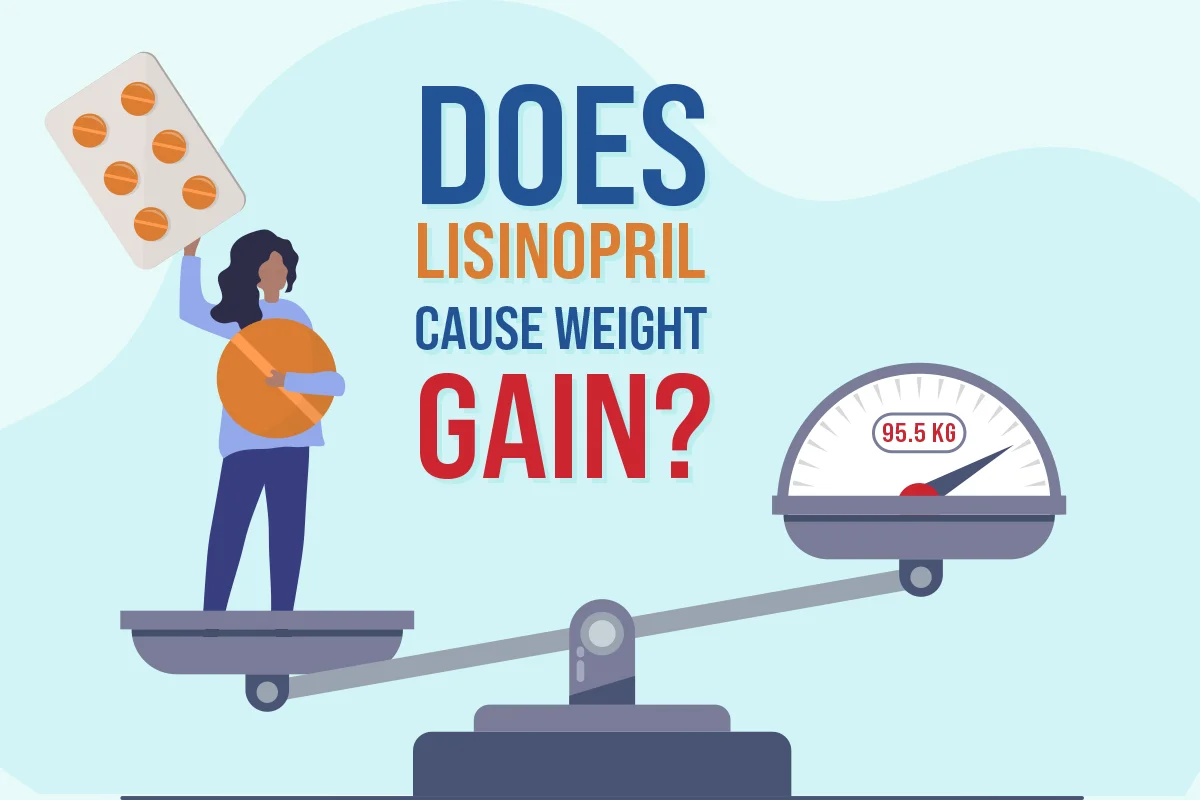Lisinopril is a drug that belongs to the angiotensin-converting enzyme (ACE) inhibitor class. It is mainly used to treat hypertension (high blood pressure) and heart failure and hinder kidney problems in diabetic patients. Moreover, adults and children above the age of six years can take Lisinopril medicine for high blood pressure. It also helps in improving the condition after a heart attack. However, the initial dose of 10mg or 5mg is taken orally once a day, while the drug may take up to four weeks to show its full effect.
Now the real question is, Does Lisinopril cause weight gain?
Does Lisinopril Cause Weight Gain?
Taking the Lisinopril drug according to prescribed measurements after consultation with your doctor will not lead to weight gain. The drug doesn't have any side effects that cause any weight changes. It will only affect patients already suffering from any other disease.
Patients who are diagnosed with kidney problems and take Lisinopril drug without any consideration or instruction, their kidney infection may get worse. This kidney infection causes fluid retention (swelling) in feet or ankles, resulting in weight changes or the development of extra weight. So taking the drug without consultation will not treat your symptoms but create more complications.
Precautionary Measures Should Be Taken To Prevent Weight Gain
Suppose your doctors recommend taking a Lisinopril tablet (that may be because you were diagnosed with heart disease or you are a high blood pressure patient). In that case, you must take some precautionary measures to prevent weight gain. If you do not consider such things, you may gain weight by taking this medicine. That's why you need to make the best changes in your lifestyle besides taking medication.
Some precautionary steps are mentioned below for this purpose:
- Get the blood test before taking Lisinopril. With a high potassium level in your blood, do not take it in the first place.
- Examine your weight during your treatment; if you're gaining weight, tell your doctor immediately.
- Make sure you get eight hours of sleep each night to get the best rest for your body.
- Intake nutritious food, including green vegetables, white meat, oats, and lentils. Avoid taking junk food.
- Do exercise regularly. Exercise is the best way to stay active and healthy.
- Take care of your mental health. Avoid taking unnecessary stress and antidepressants if you are taking any.
- Check your blood pressure while taking this medicine. Your kidney functions may also need to be checked.
What Other Factors Can Cause Weight Gain?
Some patients feel dizzy and tired after taking medicine because this helps lower high blood pressure, and as a result, most of the time, patients are found sleeping on the couch and inactive. So the lack of activity and movement will also lead to weight gain. This probably happened when the Lisinopril tablet didn't suit one's body.
So if you are also feeling drowsy after taking medicine, stop taking it because the pill is not suitable for your body mechanism, and as a consequence, you will only gain weight. Instead of taking Lisinopril, ask your doctor to recommend another medicine for your hypertension treatment.
Common Side Effects Of Taking Lisinopril
Weight gain is the side effect of taking Lisinopril when consumed without proper direction. Some other common side effects may also include:
The Best Way to Intake Lisinopril
You can prevent gaining weight and other complications if you intake Lisinopril in the best-recommended way. Your situation may vary to other patients, so you should act upon your doctor's prescription rather than follow someone else's instructions.
First, do not take medicine in heavy doses (such as 20mg) and larger quantities. If you're prescribed to take it once daily, do not take it twice or thrice daily.
Stop taking it after getting your treatment done. Do not take it for longer than advised.
Avoid dehydration when you are taking Lisinopril.
You can take Lisinopril with or without food but avoid taking it with an empty stomach, as medicines react differently when taken with an empty stomach.
Conclusion
As explained in this article, Lisinopril can cause weight gain only in specific kinds of patients. Otherwise, it will not cause weight gain if you take it according to your doctor's prescription. Besides taking medicine, drink plenty of water and urinate. This will help you in leveling your high blood pressure. Contact your healthcare provider if you notice any common or rare side effects.



 03 Jan 2023
03 Jan 2023


